ORA Oxford Thesis Collection
All theses written in fulfilment of a University of Oxford post-graduate research degree are eligible for deposit to ORA, and it has been mandated as part of the requirements surrounding a research degree for students who commenced their study from 1st October 2007 to deposit a complete copy to ORA.
For every thesis deposited, an ORA record page is created, and this content is openly shared via the ORA API, including to specific services such as the British Library's EThOS service. The ORA Oxford Thesis Collection presents the theses available within ORA. For many of these works ORA is the only space in which the content is made available, making it a valuable resource for accessing the research being undertaken by the University of Oxford students and early career researchers.
If you undertook your research degree at Oxford and would like to make your thesis available via ORA, please see the ORA theses LibGuide for further information or contact the ORA team.

Featured Work
- Harmonic maps and associated energy functionals
- Quantification of hydrocarbon leakage and subsurface fluid flow
Campbell, BL
- Is there good investment advice on r/wallstreetbets?
Latest research from across the University
Medical sciences.
- The role of emotional processing and regulation in the link between insomnia and depression
- An exploration of non-coding sequence variation across human erythroid differentiation
- Quantifying the driverness of copy number aberrations in prostate cancer
- Interactions of glucose supply, AMPK and the mTOR pathway during early in vitro human meurogenesis
- Investigating viral glycosylation pathways for drug and vaccine development
Search Medical Sciences
Maths, physical & life sciences.
- Genetic diversity in non-native conifer woodlands under Continuous Cover Forestry management in E...
- Applications of 3D printing in bioprocessing engineering
Search MPLS
Social sciences.
- Literacy in science: exploring barriers to literacy in secondary school science and the impact of...
- An exploration of the impact of oracy intervention on the quality of Key Stage Four students’ cla...
- From NAFTA to USMCA: power, path dependence, and protectionism
- To what extent does a teacher CPD intervention improve teacher knowledge and application of attac...
- Three essays on information and political belief change
Search Social Sciences
- Solomon and his retelling of the ancient israelite history: an examination of the literary struct...
- Literary translation in Mexican cultural periodicals: from modernismo to the avant-garde (1898-1931)
- Disputes of value: literary studies, the humanities and evaluative theory (1975-2015)
- The worlds of E.D. Morel, 1873-1924
- Emergency ethics: understanding climate change in the lead up to 2050
Search Humanities
Print Studio
The print studio offers you high quality printing with fast turnaround times.
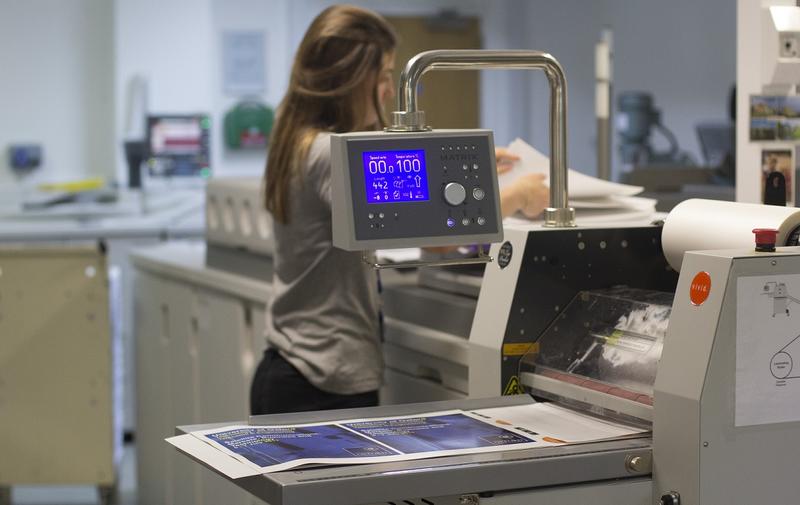
The Print Studio is open 8am to 4.30pm, Monday to Friday and is based at University offices, Wellington Square, OX1 2JD
Print services
Equipped with the latest full-colour digital printers, the University Print Studio has a proven track record of delivering quality printing that supports and enhances your brand reputation.
Roller banners, large format posters, leaflets and brochures, business cards, postcards, NCR printing and thesis printing are just part of the wide range of services that we offer.
Supporting the printing process are a range of finishing services including cutting, scoring, folding, drilling, laminating and binding in various formats.
Our skilled graphic designers (also based in Wellington Square) can design, lay out and prepare print-ready artwork.
If you would like a quotation or to discuss your needs please email the Print Team at [email protected] .
View examples of our work in the photo gallery below.
How to order
Ordering from us is quick and easy.
Ordering as a University department
Raising an order is simple, ensure you are on the University network and click the red order here button. If you are not using the network you can access it via an external system like a VPN client, for details please visit IT services website .
You will be asked to provide a cost centre code prior to completing your order (contact your Departmental Finance Officer for further information).
Ordering as a student, college or external customer
If you are a student, college, or outside the University then please contact the print studio directly to place an order. We offer a range of payment methods including:
- Telephone payment (for all major credit and debit cards)
- Chip and pin payment (available in our studio)
New customers
If you have never used the University Print Studio before, please email the print team or call to place your order.
Our sustainability commitment to you
Did you know all our paper products are FSC certified and carbon balanced through the World Land Trust ? This means that for every product purchased, one tonne of CO 2 is captured in new UK woodlands, certified under the government's Woodland Carbon Code .
So far the Print Studio has enabled 19.2m 2 of new trees and woodland in Penrith and the Lake District, and balanced over 1000kg of carbon to help protect critically threatened tropical forest.
Information goes here
View examples of our work
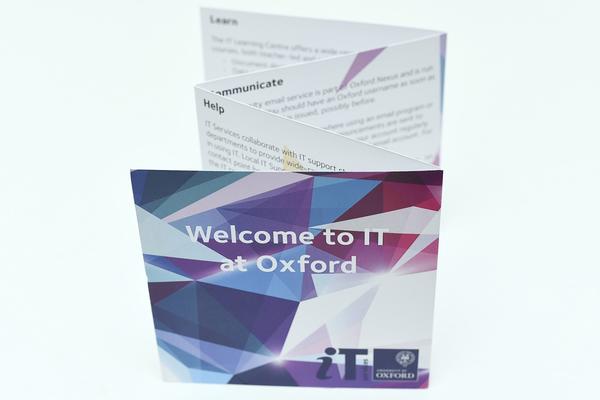
Print brilliant brochures in a range of shapes and sizes
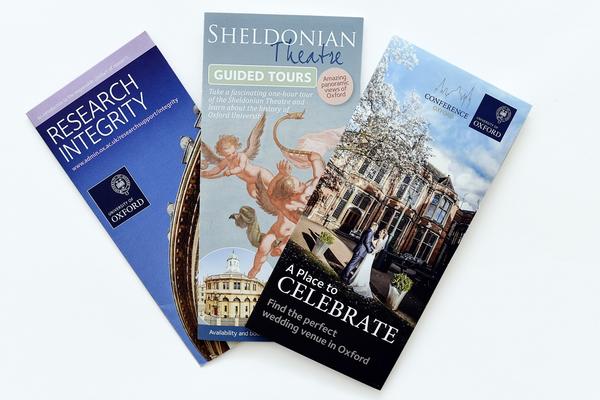
Wow your audience with eye-catching leaflets

Get a great response with colourful invitations
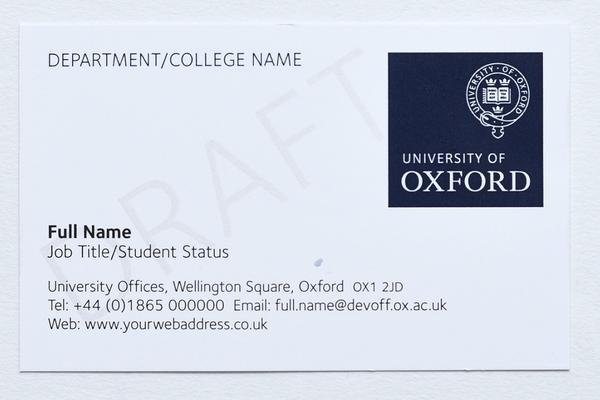
Create a good and lasting impression with our durable business cards
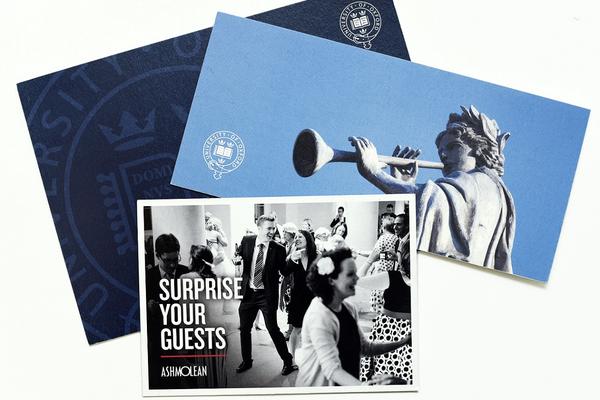
Delight delegates with high quality printed conference materials
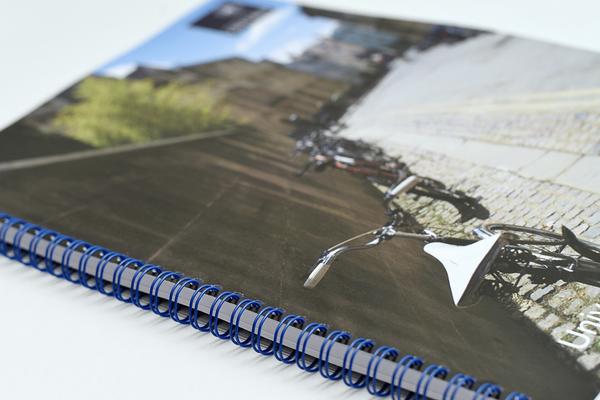
Bind your documents or thesis in a range of formats
Place your order.
Click below to raise an order
Track your print request
To track the status of your print request please click below
TRACK REQUEST
Virtual Tour
Click below to view the Print Studio virtual tour.
Data Privacy
Click here to read our privacy notice, which explains how we process your data and ensure it is secure
University Print Studio
+44 (0)1865 2 70029
Related links
- Mail service
Help us improve this site: send us feedback

Search for manuscripts and archives across the Bodleian Libraries and Oxford Colleges

What am I searching?
Manuscripts and Archives at Oxford University searches descriptions of manuscripts and archives held at the Bodleian Libraries and some Oxford colleges, from across 11 online catalogues:
- Archives and post-1500 manuscripts from Bodleian Archives and Manuscripts .
- Medieval manuscripts from Medieval Manuscripts in Oxford Libraries .
- South Asian, Inner Asian and Middle Eastern manuscripts from six manuscript catalogues .
- Hebrew manuscripts from Hebrew Manuscripts at the Bodleian Libraries .
- Charters, deeds and seals from Charters at the Bodleian Libraries .

What can't I search?
Manuscripts and Archives at Oxford University does not cover all material held at the Bodleian Libraries and Oxford college libraries and archives.
- Print holdings and electronic resources, including modern printed books, antiquarian printed books, periodicals, maps, journals, ephemera, ebooks and e-journals can be searched via SOLO (Search Oxford Libraries Online) .
- Manuscripts of East and South-East Asia are not yet catalogued online. Guidance on using these collections can be found in the Asian and Middle Eastern special collections research guide .
- Some colleges maintain their own online manuscript and archive catalogues.
- Contact & FAQ

The Research Thesis Digital Submission Quick Reference Guide for Examiners explains how to examine a digital copy of a student’s thesis and additional materials using RTDS
Contact & Help
In case of any problems or inquiries contact:
Submissions and Research Degrees Team Examination Schools 75-81 High Street Oxford OX1 4BG UAS Research Degrees Office: [email protected] Research examinations information page Tel: 01865 286384 / 286382 08:30-17:00, Monday to Friday
Frequently Asked Questions
I can’t open the files. What should I do?
First please ensure you have the programs or apps capable of opening Adobe Acrobat (PDF) files and ZIP files, if you are unsure about this please talk to your IT Support team. If it appears that the files are corrupt then please contact the Submissions and Research Degrees Team (contact details on the left-hand side of this web page) who can arrange for the files to be uploaded again.
I can’t download the files using the provided link. What should I do?
a. Ensure that the files haven’t already been downloaded to the location of the Downloads specified by your browser.
b. Contact your local IT Support.
c. If still unable to download then contact the Submissions and Research Degrees Team (contact details on the left-hand side of this web page).
I haven’t received an email for the thesis I am examining. What should I do?
Please contact the Research Degrees Team. It is most likely that either the student has not yet submitted or that your fellow examiner has not yet accepted the formal invitation.
I have lost the email containing the thesis file links. What should I do?
Contact the Submissions and Research Degrees Team (contact details on the left-hand side of this web page) who will be able to send you a new link.
I have changed my email address. Who do I need to contact?
Contact the Submissions and Research Degrees Team (contact details on the left-hand side of this web page) with your new details.
What happens if the title of a thesis has been changed, but the original title is showing on the upload screen?
This could be because either the candidate hasn’t informed their GSA and Submissions and Research Degrees Team of the new title or there is a delay in processing the title change.
What happens if I realise that the student has not submitted an accompanying document which is referred to in the main thesis document?
You should contact the Submissions and Research Degrees Team (contact details on the left-hand side of this web page), who will arrange for the files to be made available.
Is it safe to download files using the provided links?
Yes, the files have been checked for viruses and are safe to download.
I received an email not meant for me. What should I do?
Forward the email to the Submissions and Research Degrees Team (contact details on the left-hand side of this web page) stating why you shouldn’t have received the email.
What are the additional files for?
The additional files are any document(s) that are part of the thesis but either too large to be included with it or of a different media type to the main body of the thesis. This could include sound recordings, photographs, programming, video, etc.
What happens if an examiner has downloaded the thesis, which the student has now realised is the ‘wrong’ file?
The student will need to contact the Research Degrees Team in the first instance.
How do I zip or/and unzip files and what can I include in my ZIP files?
You need to use a program or app to create or open a ZIP file, if unsure please talk to your local IT support team.
I have reached the maximum number of downloads. What should I do?
Please contact the Submissions and Research Degrees Team (contact details on the left-hand side of this web page). They will be able to reset the number of downloads permitted.
The student has sent me their thesis copy by email. Why do I need this version?
The RTDS version is the offical submission. Please do not accept any other version from the student. This could lead to the examination being deemed void.

- Thesis Binding
- Digital Printing
- Litho Printing
- Banners / Posters / Plan Prints
- Promotional Merchandise
Due to staff holidays, the shop will be closed from Monday 22nd April to Monday 29th April.
We will continue to accept enquiries by email & phone. Local delivery will be arranged.
The shop will reopen on Tues 30th April. Please accept our apologies for any inconvenience this may cause

Hardback Binding

Bodleian standard (2 day service)
Square back in Buckram cloth with plain white endpapers and gilt spine title
| Single copy: | £43.00 each |
| 3 copies or more: | £42.00 each |
| Express service: | £34.00 extra per copy (24hours) |
Standard colour: (Bodleian requirement is Dark Blue 541) Extra Secondary colours: (Black 585, Dark Red/Burgundy 567 and Dark Green 563): £6.00
These prices excludes printing
Non specified extras: (for personal copies)
| Non-Standard cloth colours available | £12.00 extra each |
| Leatherette finish (choice of 6 colours) | £18.00 each |
| Rounded spine with gold head & tail bands | £28.00 each |
| University or college crest gilt on front (from existing master dies) | £13.00 each |
| Front cover lettering up to 4 lines (30 letters per line maximum) | £20.00 (4 lines) |
| Softback in cloth with spine title | Price on request |
Information on Binding Service
- Normal binding time is 2 working days if received before 2.00pm Day 1, ready 3.30pm Day 3 (weekends & public holidays excluded).
- Copying and print out from your file at bulk rates according to quantity, subsequent copies at relevant bulk rates (please allow extra production time).
- Book Boxes - Corrugated to fit A4 and adjustable to book thickness, self sealing, protects corners for safe delivery.
- These prices exclude printing costs, which will be quoted upon sight of pdf file
- Library Guides

Oxford Referencing
Oxford referencing: theses.

- Getting started with Oxford referencing
- Books & e-books
- Journal articles
- Internet/websites
- Legislation
- Conference proceedings
- Personal communications
- Multi-media materials
- Generative AI
- Sample Reference List
On this page
Basic format to reference a thesis.
- Referencing a thesis: Examples
Format for footnotes for a thesis:
1 A. Author, Title of Thesis: Subtitle in Italics , Ph.D. or MA diss., Place of Publication, Publisher, Year of Publication, p. xx.
1 C. Suwetwattanakul, Developing a Knowledge Sharing Model for the Implementation of the Learning Organization in Thailand, Ph.D. diss., Melbourne, Victoria University, 2010, p. 267.
| Material Type | Footnote Example | Reference List Example |
|---|---|---|
| C. Suwetwattanakul, , Ph.D. diss., Melbourne, Victoria University, 2010, p. 267.
| Suwetwattanakul, C., , Ph.D. diss., Melbourne, Victoria University, 2010. | |
| | W. Abur, MA diss., Melbourne, Victoria University, 2018, p. 1, http://vuir.vu.edu.au/id/eprint/36189, (accessed 30 April 2019). | Abur, W., MA diss., Melbourne, Victoria University, 2018, http://vuir.vu.edu.au/id/eprint/36189, (accessed 30 April 2019). |
- << Previous: Internet/websites
- Next: Legislation >>
- Last Updated: Jun 12, 2024 10:31 AM
- URL: https://libraryguides.vu.edu.au/oxford-referencing

Print, copy and scan
You can use our Print , Copy and Scan (PCAS) facilities to print documents and to copy library items.
Readers are welcome to use personal digital cameras and scanners , subject to restrictions.
What is PCAS?
PCAS is used across all Bodleian Libraries to manage and pay for your printing, copying and scanning. You can send documents to print from any location and collect them at any PCAS-enabled device in the libraries, and make copies of library items.
Your PCAS account can also be used to pay for Scan and Deliver and inter-library loan services.
Your PCAS account
If you have a University or Bodleian Reader card, you will automatically receive a PCAS account. Use your Bodleian Libraries username and password to log into PCAS.
Log into PCAS
You can top up your account by:
- debit or credit card (minimum £0.10, maximum £200)
- using cash (Continuing Education Library)
Please note that we cannot refund partially used credit.
Link your library card
You can link your University or Bodleian Reader card to your PCAS account on any PCAS-enabled library device. Tap your card on the touchpad and enter your Bodleian Libraries username and password when prompted. Next time, you can tap your card on the machine to log in.
The current costs for printing, copying and scanning are:
| Type and size | Single | Double |
|---|---|---|
| Black and white, A4 | 6p | 9p |
| Black and white, A3 | 10p | 15p |
| Colour, A4 | 20p | 30p |
| Colour, A3 | 40p | 60p |
| Scanning | Free | Free |
PCAS terms and conditions
The following terms and conditions apply to the use of this service. By using this service, you agree to be bound by them.
Account expiry
Accounts will expire when your University or Bodleian Reader card expires. Unused credit can be transferred to a renewed or new card, as long as all the necessary details are provided. Email [email protected] for support.
We can only refund complete, unused PCAS credit that has been added to your account using a credit/debit card within 2 years of the initial transaction. It can only be refunded back onto the bank card that you used to add it. Partially used credit and cash top-ups cannot be refunded. Please email PCAS if you require further information.
- "We" are The Chancellor, Masters and Scholars of the University of Oxford, whose administrative offices are at University Office, Wellington Square, Oxford, OX1 2JD, England.
- If you have a service-related query, you may contact us as follows: Bodleian Libraries Room 1.04, Weston Library, Oxford, OX1 3BG. Phone: 01865 277070 Email: [email protected]
- Our VAT number is GB 125 5067 30.
- This service allows you to make an online payment to credit your account for pre-paid printing, copying and scanning.
- To use this service you will be required to use a printing account and access the internet-based payment method.
- To credit your printing account using this online payment service, you will need to complete a payment form.
- Once you have completed the payment form, you will receive an email from us acknowledging receipt of your payment and providing confirmation that your account has been credited. If you do not receive such an email, or if you encounter an error message during or after the submission of the payment form, your payment has not been processed.
- You will only be able to use your PCAS account in The Bodleian Libraries.
- You may cancel your payment within seven (7) working days. To do so you must notify us in writing or other durable medium (including email) within those seven (7) working days. You will then be entitled to a refund from us, which will be paid to you (using the same method employed to make your payment) as soon as possible, but in any event within thirty (30) days.
- Notwithstanding clause 4.1, you will not be entitled to a refund if you have used your print account during those seven (7) working days and if the amount that remains standing to your credit is less than your payment.
- Information you provide: Any information you provide to us will be governed by our Privacy Policy . Any information you provide to third parties (such as the proprietor of the payment site) will be governed by their terms and conditions.
- Subject to clause 6.3 and to the extent permitted by law, we expressly exclude: (a) all conditions, warranties and other terms which might otherwise be implied by statute, common law or the law of equity; (b) any liability for indirect or consequential loss; and (c) any liability for loss of income or revenue, loss of business, loss of profits or contracts, loss of anticipated savings, loss of data, loss of goodwill or wasted management or office time, in each case whether direct or indirect and whether caused by breach of contract, tort (including negligence) or otherwise, even if foreseeable.
- Our total liability in contract, tort (including negligence or breach of statutory duty) or otherwise arising in connection with the performance or contemplated performance of these terms will be limited to the amount paid by you for the service concerned.
- Nothing in these terms excludes or limits our liability for death or personal injury caused by our negligence or for fraudulent misrepresentation.
- Force majeur: We will not be liable or responsible for any failure to perform, or delay in performance of, any of our obligations under these terms that is caused by events outside our reasonable control.
- Entire agreement: These terms and conditions and any document expressly referred to in them constitute the whole agreement between us and supersede any previous arrangement, understanding or agreement between us, relating to the service.
- Alterations We may alter these terms from time to time, following which all use of our website will be governed by that version. You should check the terms prior to each use of the service.
- Law: These terms shall be governed by and construed in accordance with the law of England; and the English courts shall have exclusive jurisdiction to deal with any dispute which may arise out of or in connection with them.

Using the PCAS facilities in the libraries
How to print.
Printing from a library PC or from your laptop or mobile to the printers in our libraries.
How to scan
Scan items and send them to an email address or to a memory stick.
How to copy
Photocopy items in the libraries in black and white, and colour.
Email: [email protected]
Related links
- Scan and deliver Receive scans by email of book chapters or journal articles
- Inter-library loans Order material from other institutions
- Imaging services Find and buy, for editorial and other use, high quality images of the Bodleian Libraries' collections
- Special collections mediated copying Digital scans of unrestricted special collections items
- Library account and password Register for your account to access SOLO, Wi-Fi and library computers
- Our research
- Our research groups
- Our research in action
- Research funding support
- Summer internships for undergraduates
- Undergraduates
- Postgraduates
- For business
- For schools
- For the public
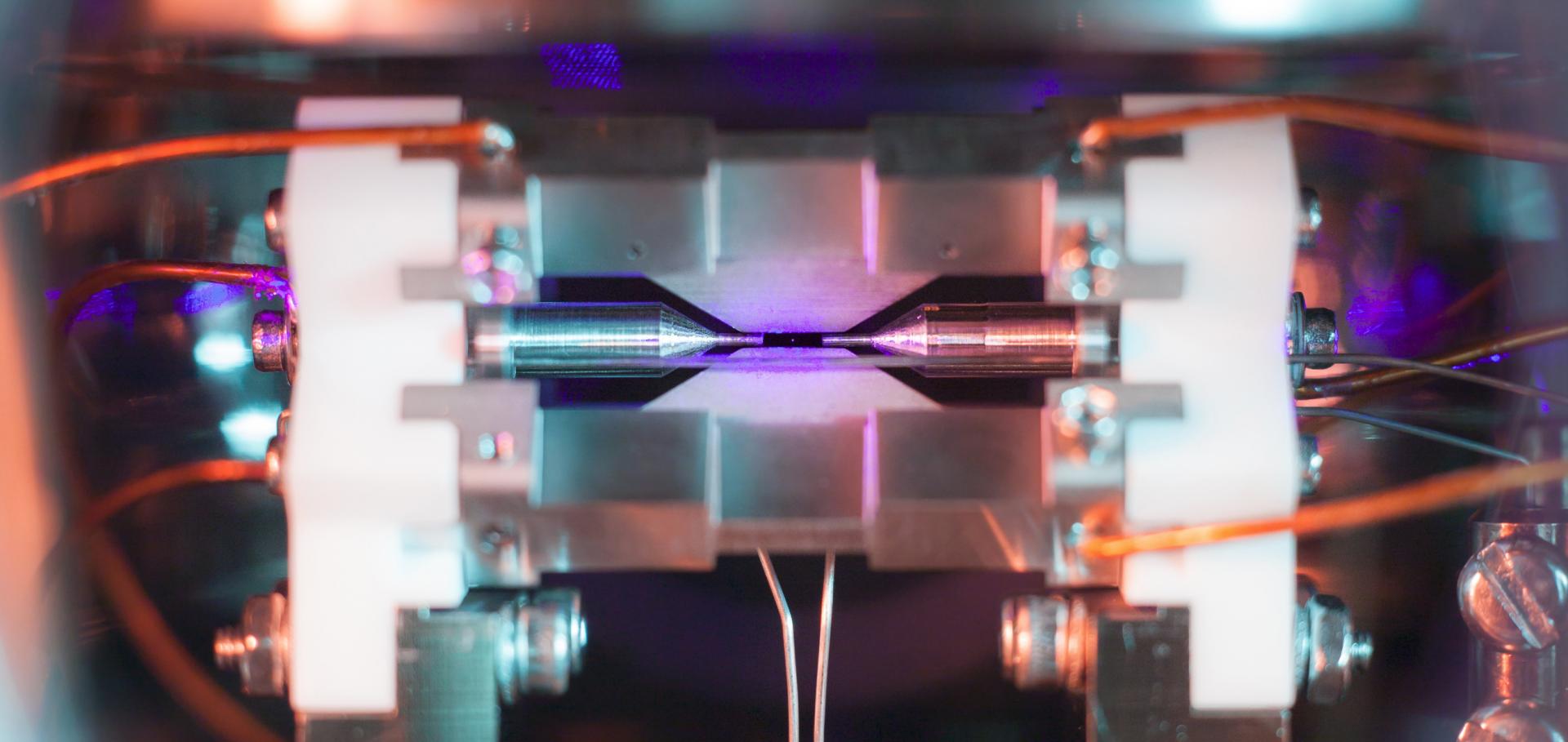
Ion trap quantum computing
Research group
Research theme
- Quantum information and computation
Sub department
- Atomic and Laser Physics
Related research groups
- Atom-photon connection
- NMR quantum computing
- Ultracold quantum matter
Doctoral Theses
High-fidelity, near-field microwave gates in a cryogenic surface trap marius weber 2022.
Implementation of Mølmer-Sørensen two-qubit gates on 43 Ca + hyperfine clock qubits in a cryogenic (≈25K) surface trap, driven by near-field microwaves. We achieve gate durations of 154µs (with 1.0(2)% error) and 331µs (0.5(1)% error), which approaches the performance of typical laser-driven gates. In the 331µs gate, we demonstrate a new Walsh-modulated dynamical decoupling scheme which suppresses errors due to fluctuations in the qubit frequency as well as imperfections in the decoupling drive itself. Development of an ion transport toolbox, with demonstrations of splitting and merging operations in two different traps.
Device-independent key distribution between trapped-ion quantum network nodes David Nadlinger, 2022
Implementation of a complete protocol for device-independent quantum key distribution over a quantum network link, resulting in the generation of a 95884-bit shared private key, after 8.5 hours of run time. This is enabled by the high-rate (100s -1 ), high-fidelity [96.0(1)%] generation of Bell states between remote trapped-ion qubits, yielding a detection-loophole-free CHSH inequality violation of 2.677(6) and quantum bit error rate of 1.44(2)%, both of which are stable during the generation of millions of Bell pairs. We also introduce a versatile method for micromotion compensation using time-stamped photon detection; we achieve a sensitivity to stray electric fields of 0.1 Vm -1 /\(\sqrt{\rm Hz}\).
An elementary quantum network of entangled optical atomic clocks Bethan Nichol, 2022
Demonstration of entanglement-enhanced frequency comparison of two optical atomic clocks based on the 674nm quadrupole transition of 88 Sr + ions, which are linked by a quantum-optical fibre link (\(\approx 2\)m long). We show that the use of an entangled state reduces the measurement uncertainty by nearly \(\sqrt{2}\), the value expected for the Heisenberg Limit. Today's optical clocks are typically limited by dephasing of the probe laser; in this regime, we find that entanglement yields a factor 2 reduction in the measurement uncertainty compared to conventional correlation spectroscopy techniques. We demonstrate this enhancement for the measurement of a frequency shift applied to one of the clocks.
A cryogenic trap for microwave-driven quantum logic using 43 Ca + ions Clemens L ö schnauer, 2021
Development of single and two-qubit operations for a new hyperfine atomic clock qubit, operating at 28.8mT in 43 Ca + , in a cryogenic surface-electrode trap. A single ion is laser-cooled to 0.5mK, close to the Doppler limit, by exploiting two-photon dark resonances that form between fine-structure levels. Resolved-sideband cooling on a Raman transition is used to cool the two-ion radial motional mode to an average occupation number \(\bar{n}=0.08\) . Spin-motion entanglement driven by near-field microwaves is used to diagnose the Mølmer–Sørensen interaction. Initial two-qubit gate attempts give a fidelity 0.77(2).
Benchmarking memory and logic gates for trapped-ion quantum computing Amy Hughes, 2021
Characterisation of the memory performance of a 43 Ca + clock qubit: randomised benchmarking is used to directly measure errors as small as 1.2(7) × 10 −6 after a storage time of 1 ms. The memory error remains < 10 −4 for up to 50 ms with no additional dynamical decoupling, or < 10 −3 for up to 2 seconds with a simple CPMG sequence. Comparison of different implementations of mixed-element two-qubit gates on a 43 Ca + - 88 Sr + crystal: a light-shift gate with a fidelity of 99.8(1)% or 99.7(1)%, measured using partial state tomography or interleaved randomised benchmarking respectively, and several varieties of Mølmer–Sørensen gates with measured fidelities of up to 99.6(2)%.
High-fidelity mixed species entanglement of trapped ions Keshav Thirumalai, 2019
High-fidelity mixed-species quantum logic gates between 43 Ca + and 88 Sr + ground-level qubits. Demonstration of a Ca-Sr logic gate, using a single 402nm laser system tuned midway between S-P dipole transitions of these two species, and characterization of the gate by several methods (Bell state tomography, process tomography and randomized benchmarking). An entangled state fidelity of up to 99.8% is achieved, comparable to that of the best same-species gates. A same-species Sr-Sr gate is also demonstrated, using the 674nm S-D quadrupole transition, with fidelity 96%.
Cryogenic, near-field quantum logic chips with passive field nulling on 43 Ca + Jochen Wolf, 2019
Design and characterization of our first cryogenic ion trap apparatus. Design of UHV system for both room temperature and cryogenic (LHe) operation using a flow cryostat. Description of new chip trap design for microwave-driven high-fidelity entangling gates, using a novel electrode layout for passive field nulling. Development of a wafer-scale chip fabrication process and eutectic chip bonding technique. Preliminary study of ion loading rates. Initial characterization of microwave field distribution above the chip using a single calcium-43 ion.
Entanglement between nodes of a quantum network Laurent Stephenson, 2019
Construction of our first quantum networking experiment. Demonstration of high-rate, high-fidelity remote entanglement of two 88 Sr + ions, trapped in two separate vacuum systems "Alice" and "Bob", connected by a 4m-long quantum-optical fibre link (qubit separation ~2m as the crow flies). Achievement of heralded entanglement with fidelity 94% at an average rate of 182 Bell pairs per second (success probability 0.022%). Generation of single-ion/single-photon entanglement with fidelity 97.9% at a rate of 5700 events per second.
Fast gates and mixed-species entanglement with trapped ions Vera Schäfer, 2018
Fast entangling gates using amplitude-shaped pulses on 43 Ca + , reaching a fidelity of 99.8% in 1.6µs and 60% in 480ns. Bell test experiment on 43 Ca + - 40 Ca + mixed-species crystal and demonstration of mixed species entangling gate on 88 Sr + - 43 Ca + .
Probing qubit memory errors at the 10 −5 level James Tarlton, 2018
Direct measurement of qubit memory errors in a calcium-43 "atomic clock" qubit. Randomized memory benchmarking is used to measure the memory error of a single qubit down to the few 10 -6 level. The error is found to remain below the 10 -3 level for up to 400ms. Surface trap designs for near-field microwave-driven two-qubit gates are explored.
A high-fidelity microwave driven two-qubit quantum logic gate in 43 Ca + Martin Sepiol, 2016
Experimental implementation of a microwave-driven two-qubit quantum logic gate in a room-temperature microfabricated surface ion trap. The gate scheme involves dynamical decoupling methods, which stabilise the qubits against fluctuations of the motional mode frequency and fluctuating energy shifts, and avoid the need to null the microwave field. The gate is applied directly to hyperfine "atomic clock" qubits in 43 Ca + using the near-field microwave magnetic field gradient produced by an integrated trap electrode. The achieved gate fidelity is 99.7(1)%, after accounting for state preparation and measurement errors.
Near-field microwave addressing of trapped-ion qubits for scalable quantum computation Diana Prado Lopes Aude Craik, 2016
Demonstration of high-fidelity spatial and polarization addressing of trapped-ion "atomic clock" memory qubits using near-field microwaves. Addressing is performed by interfering fields from integrated microwave electrodes to address a chosen trap zone whilst nulling crosstalk fields in the neighbour zone. Design of a next-generation ion trap which can perform near-field microwave addressing in a quantum CCD architecture without the need for nulling fields. Demonstration of a prototype micro-fabricated loop antenna for microwave characterization of chip ion traps.
Optical Bloch equations for simulating trapped-ion qubits Hugo Janacek, 2015
Modelling temperature and fluorescence of a trapped ion using the optical Bloch equations. Development of efficient simulations that solve the time-dependent and time-independent problems for systems with large numbers of states. Introduction of a routine designed to model the approach to the steady state. Analysis of Doppler cooling incorporating motion of a trapped ion and the effects of repumping from a D state. Development of cooling schemes for 43 Ca + at 146G and comparison with experiment. Demonstration of Doppler cooling below the Doppler limit for this isotope. Analysis of resonant effects in systems with more than three levels and comparison with experiment.
Linear Paul trap design for high-fidelity, scalable quantum information processing Sarah Woodrow (M.Sc. Thesis), 2015
Design of a new linear 'blade' trap, with improved optical access. Review of linear Paul trap theory. Discussion of axial micromotion and its use for ion addressing. Numerical simulations of trap fields. Technical drawings of trap components.
High-fidelity quantum logic in Ca + Christopher Ballance, 2014
High-fidelity single- and two-qubit laser-driven logic gates in 43 Ca + hyperfine qubits. Theoretical and experimental study of speed/fidelity trade-off for two-qubit gates. Achievement of single-qubit gate fidelities above 99.99%, and two-qubit gate fidelities ranging between 97.1(2)% (for a gate time of 3.8µs) and 99.9(1)% (at 100µs), after accounting for single-qubit operation and readout errors (each at the 0.1% level). Demonstration of a mixed-species ( 43 Ca + and 40 Ca + ) entangling gate with a fidelity of 99.8(5)%.
High-fidelity microwave-driven quantum logic in intermediate-field 43 Ca + Thomas Harty, 2013
Development of an intermediate magnetic field "atomic clock" qubit in 43 Ca + at 146G and high-fidelity techniques to manipulate this qubit using microwaves and lasers in a microfabricated surface-electrode ion trap. Randomized benchmarking of a single qubit. Work towards microwave-driven two-qubit gates including a theoretical analysis of likely sources of experimental error.
Background-free detection and mixed-species crystals in micro- and macroscopic ion-traps for scalable QIP Norbert Linke, 2012
Assembly and testing of a microstructured 3D ion trap. Background-free detection and read-out of trapped ions. Raman laser system consisting of two injection-locked frequency-doubled lasers. Ground-state cooling and coherent manipulation of a mixed-species crystal in a macroscopic ion trap.
Surface-electrode ion traps for scalable quantum computing David Allcock, 2011
Design, fabrication and testing of microfabricated surface-electrode ion traps. Pulsed laser cleaning of ion traps to reduce anomalous heating. An intermediate-field hyperfine "atomic clock" qubit in 43 Ca + . Design, construction and testing of an ion trap incorporating microwave resonators for microwave-driven quantum logic gates.
High fidelity readout of trapped ion qubits Alice Burrell, 2010
High-fidelity readout of trapped ion qubits. Demonstration of time-arrival resolved discrimination of ion states (TARDIS) with a photomultiplier detector to perform single-shot readout of a single 40 Ca + optical qubit with 99.991(1)% fidelity. Replacing the photomultipler by an electron-multiplying CCD camera, the TARDIS method allows discrimination in both spatial and temporal dimensions, enabling achievement of the same 99.99% readout fidelity for a 4-ion "qunybble", despite 4% optical cross-talk between neighbouring ions.
Measurement-selected ensembles in trapped-ion qubits Michael Curtis, 2010
Segmented ion trap modelling; measurement-selected ensembles (weak measurement); operation of planar and 7-electrode traps; implementation of a qubit in D5/2 state of 40Ca; partial collapse and `uncollapse' experiments.
High fidelity readout and protection of a 43 Ca + trapped ion qubit David Szwer, 2009
Rate equations programs for simulation of 43 Ca + ; comparison with experiment and Bloch equations. Simulation and optimisation of a robust, high-fidelity readout method from 43Ca+; experimental implementation. Attempted two-qubit gate with 40 Ca + and 43 Ca + mixed crystal; problems with crystallisation; electrode noise; measurement of heating rate, motional decoherence and "Schrodinger Cat" states. Derivation of Uhrig Dynamical Decoupling (UDD); review of the literature; experimental implementation of UDD and CPMG on 43 Ca + hyperfine ground-state qubits.
Implementing segmented ion trap designs for quantum computing Gergely Imreh, 2008
Numerical modelling of multiple-electrode traps. Ion shuttling and loading theory. Set-up of apparatus (including vacuum system, lasers and optics and control electronics) for trapping and experimenting with microfabricated "Sandia trap". Detailed evaluation of "Sandia trap": loading and micro-motion compensation; measurement of ion lifetime, motional frequency and heating rate; demonstration of ion shuttling.
A quantum memory qubit in calcium-43 Benjamin Keitch, 2007
Design and construction of various experimental apparatus: Laser Control Unit for precise pulse timing; master-slave 398nm laser system for Raman transitions in the hyperfine ground states of 43 Ca + ; KILL-110 system for PDH locking of lasers to optical cavities. Investigation of magnetic field fluctuations, using microwaves and 43 Ca + hyperfine states; Spicer SC20 field cancelling system tested. Demonstration of long T2 coherence time of 43 Ca + hyperfine clock state qubit.
Entanglement of two trapped-ion spin qubits Jonathan Home, 2006
Careful study of sideband cooling and temperature diagnostics for one and two ions. Motional coherence measurements. Coherent manipulation of two ions. Spin state tomography for two ions. Quantum logic gate by oscillating force; deterministic entanglement. For electrode configurations for trap arrays, see Home and Steane paper, 2006.
Raman sideband cooling and coherent manipulation of trapped ions Simon Webster, 2005
Photoionisation, Rabi/Ramsay experiments on single spin qubits by magnetic resonance and stimulated Raman transitions, continuous Raman sideband cooling using bright/dark resonance, pulsed Raman sideband cooling to the motional ground state, temperature diagnostics for 1 and 2 ions, rate equations for Ca-43.
Two-photon readout methods for an ion trap quantum information processor Matthew McDonnell, 2003
MOPA 397 laser system, servo theory, Pound-Drever-Hall (and other) locking, optical Bloch equations, dark resonance fits, dark resonance cooling/heating, spin state readout: various methods, EIT method proposed and implemented.
Stabilization and control in a linear ion trap John-Patrick Stacey, 2003
Reference cavities, improved photon counting, photon arrival time correlation method for micromotion compensation, new 850 laser, AOM optics, r.f. study towards helical resonator, magnetic field coils, dark resonances, isotope-selective photoionisation in detail.
Marek Š a š ura, 2002
Survey of ion/laser coupling theory, theoretical study of "pushing" gate method.
Development of an ion trap quantum information processor Charles Donald, 2000
Some space charge ideas, general apparatus development, imaging, spectroscopy of blue laser diodes, field compensation drift, precise D 5/2 lifetime measurement, upper bound on 2- and 3-ion quantum jump correlations and statistical analysis.
The quantum manipulation of ions David Stevens, 1999
Construction from scratch of our first ion trap, some Mathieu equation and Doppler cooling theory, optogalvanic spectroscopy, frequency doubling, observations of crystals and quantum jumps, first look at D 5/2 lifetime measurement.
- News & Comment
- Our facilities & services
- Current students
- Staff intranet

Submitting your thesis to ORA: Oxford Research Theses and predatory publishers
- Eligible degrees
- Requirements
- What to deposit
- Pre-deposit checklist
- Hardcopy thesis submission
- How to deposit
- Open Access
- Pre-publication concerns
- Restricted access to your thesis
- Edited/dissemination copy of your thesis
Oxford Research Theses and predatory publishers
- Funder/sponsor requirements
- Third party copyright
- Fair dealing
- RightsLink®
- Google Maps/Permissions
- Creative Commons
- Unable to get copyright permissions
- Separate appendix
- Plagiarism concerns
- Information for Supervisors
- Digital preservation
- Visibility of your thesis
- Persistent URLS
Please be aware that the author of the thesis usually [1] holds the copyright of their thesis. The University of Oxford does not assert copyright over research theses.
A number of Oxford research students consider publishing their thesis as a monograph and may spend significant time finding a publisher and going through the editorial process.
Some early career researchers are approached by external organisations to publish their thesis. Understandably, this can be flattering for the researcher. Although some unsolicited approaches are from reputable publishers, many of these offers are from predatory publishers [2] .
Typically a predatory publisher wants to obtain the thesis copyright, meaning you would relinquish control over your own work, including how or where it is used, or to whom it may be sold for the publisher’s sole profit.
The following should be kept in mind:
- However, please be aware that some funding bodies exert an influence on whether, but usually when, the thesis content is released publicly
- Authors are strongly advised to research carefully any unsolicited publishing offer and the publishing company making the offer to ensure that the company is reputable and their intentions acceptable
- Any paperwork or agreement issued by the publisher should be read carefully, particularly in regards to copyright transfer and future use of the work
Queries should be addressed to subject librarians in the first instance.
[1] If your thesis forms part of a body of research being carried out by your Department, Research Group or a Doctoral Training Centre, you may need to clarify this.
[2] The University of Cambridge has a very helpful page on predatory publishers .
Oxford Research Archive (ORA)

ORA (Oxford University Research Archive) is the institutional repository for the University of Oxford and is home to the scholarly output of its research members.
Contact us at: [email protected] , or via our contact form .
- << Previous: Edited/dissemination copy of your thesis
- Next: Funder/sponsor requirements >>
- Last Updated: Jun 28, 2024 2:06 PM
- URL: https://libguides.bodleian.ox.ac.uk/digitaltheses
Website feedback
Accessibility Statement - https://visit.bodleian.ox.ac.uk/accessibility
Google Analytics - Bodleian Libraries use Google Analytics cookies on this web site. Google Analytics anonymously tracks individual visitor behaviour on this web site so that we can see how LibGuides is being used. We only use this information for monitoring and improving our websites and content for the benefit of our users (you). You can opt out of Google Analytics cookies completely (from all websites) by visiting https://tools.google.com/dlpage/gaoptout
© Bodleian Libraries 2021. Licensed under a Creative Commons Attribution 4.0 International Licence

IMAGES
VIDEO
COMMENTS
Oxford theses The Bodleian Libraries' thesis collection holds every DPhil thesis deposited at the University of Oxford since the degree began in its present form in 1917. Our oldest theses date from the early 1920s. We also have substantial holdings of MLitt theses, for which deposit became compulsory in 1953, and MPhil theses.
Welcome to Oxford Print Centre Oxford's leading Thesis Binding and digital printing service to Oxford University colleges, departments and students.
All theses written in fulfilment of a University of Oxford post-graduate research degree are eligible for deposit to ORA, and it has been mandated as part of the requirements surrounding a research degree for students who commenced their study from 1st October 2007 to deposit a complete copy to ORA. For every thesis deposited, an ORA record ...
Many Oxford theses held in digital form by the libraries are available for download via the Oxford Research Archive (ORA). Where ORA holds a digital copy of a thesis but it is not yet available for download - due to an embargo period or other restriction - a record for the thesis will exist in ORA, and you can request access via the ORA contact form.
It is best to split the thesis at the appendices or at the beginning of a new chapter. Soft binding costs £8.25 excluding printing. If you have left your viva submission until the last minute. Don't panic, binding it really takes only one hour!
This guide relates to the process of depositing theses to the Oxford University Research Archive (ORA). Students should use this guide to check eligibility to deposit, how to deposit and how to comply with examination regulations. Supervisors can find out which forms their students need to complete and how they can comply with exam regulations.
The Print Studio offers you high quality printing with fast turnaround times. You can find out more here about its product range including posters, leaflets, cards, postcards, banners and document binding.
How to find and access theses and dissertations held by the Bodleian Libraries and other institutions.
Oxford Theses SOLO Search for print and electronic Oxford DPhil theses in the library catalogue. Electronic versions will link directly to the record in ORA. Limit your search to "Theses". Oxford Research Archive (ORA) Search for and download recent (2006+) Oxford DPhil theses.
Theses and dissertations are documents that present an author's research findings, which are submitted to the University in support of their academic degree. They are very useful to consult when carrying out your own research because they: provide a springboard to scope existing literature. provide inspiration for the finished product.
Print holdings and electronic resources, including modern printed books, antiquarian printed books, periodicals, maps, journals, ephemera, ebooks and e-journals can be searched via SOLO (Search Oxford Libraries Online) .
Welcome The Research Thesis Digital Submission Quick Reference Guide for Examiners explains how to examine a digital copy of a student's thesis and additional materials using RTDS Research Theses Digital Submission
Dissertations, theses, assignments At Mail Boxes Etc. Oxford - Summertown we know what a headache it can be to get your dissertation, thesis or assignment printed and bound. While we can't help you with all the hard work that goes into writing it, the team at Mail Boxes Etc. Oxford - Summertown can certainly print and bind it beautifully to your exact specifications for you to collect in ...
Copying and print out from your file at bulk rates according to quantity, subsequent copies at relevant bulk rates (please allow extra production time). Book Boxes - Corrugated to fit A4 and adjustable to book thickness, self sealing, protects corners for safe delivery.
Basic format to reference a thesis Format for footnotes for a thesis: 1 A. Author, Title of Thesis: Subtitle in Italics, Ph.D. or MA diss., Place of Publication, Publisher, Year of Publication, p. xx. Example:
Print, copy and scan You can use our Print, Copy and Scan (PCAS) facilities to print documents and to copy library items. Readers are welcome to use personal digital cameras and scanners, subject to restrictions.
Demonstration of Doppler cooling below the Doppler limit for this isotope. Analysis of resonant effects in systems with more than three levels and comparison with experiment. Linear Paul trap design for high-fidelity, scalable quantum information processing Sarah Woodrow (M.Sc. Thesis), 2015
To find theses and dissertations in Oxford On SOLO - just add the word thesis to your searches. For instance, if you search for oxford thesis education and then use the Resource Type filter to choose Theses (Oxford), you will get a large selection of theses & dissertations on educational topics.
Oxford Print Centre, Oxford, Oxfordshire. 71 likes · 20 were here. Oxford's leading printing and Thesis binding centre.
Alongside your thesis you need to include a completed and signed Graduate Studies Office 'Information for Thesis Cataloguing' (GSO.26) form. This form can be found on the Graduate Forms webpage ( Graduate forms | University of Oxford ), and physical copies are available at the Library Information Desk.
Oxford Thesis Printing - Free download as PDF File (.pdf), Text File (.txt) or read online for free.
The following conditions must be met in order to deposit your thesis: The degree for which your thesis was written is eligible for deposit (see: eligible degrees) The deposited file should be the final examined version as it was passed by the examiners with all corrections included (see: what to deposit) Inclusion of the thesis in ORA must not ...
A number of Oxford research students consider publishing their thesis as a monograph and may spend significant time finding a publisher and going through the editorial process.